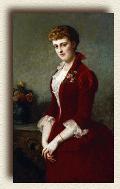Friday, December 30, 2005
Thursday, December 29, 2005
On Being Civilized.
 Today was one of those boring days when I just work and think, and think about how nice it would be to not work.
Today was one of those boring days when I just work and think, and think about how nice it would be to not work.I am still a bit ill from a cold I contracted while on holidays.
I’ve been thinking a bit about the Ayn Rand quote I placed on the Splash du Jour this morning. I’ll reprint it here:
Civilization is the progress toward a society of privacy. The savage's whole existence is public, ruled by the laws of his tribe. Civilization is the process of setting man free from men.
I do not know all that much about Ayn Rand.
To be honest, there is no author that I have neglected reading, moreso than Ayn Rand. By that I mean I have her books, I have wanted to read them for ages and have failed to do so for one reason or another. But I do know just a wee bit about the topics of “objectivism” and “selfishness” [hedonism?] as espoused by Rand.
She interests me. Makes me curious. Really fascinates me.
In thinking about the above mentioned quote, I can envision many people [people that I happen to know] objecting to it.
After all, doesn’t the idea (or ideal) of “civilization” involve working together to accomplish greater things than could be accomplished by oneself?
Isn’t Rand decrying (or at least belittling) the benefits of cooperation in society?
The answer that I came up with today is “No, she is not.”
See, I think that there are many people that may read Rand’s somewhat bald statement as it is here presented by me [to be honest, I do not even know the surrounding context of it] as saying something like Civilization is the progress toward a society of being alone.
And I don’t think she is saying that. Not at all.
There is nothing “civilized” about the mere fact of aloneness for aloneness’s sake!
And there's a big difference between privacy and being alone.
Civilization marching toward greater measures of aloneness would not be progression, but regression.
But I think she is saying that civilization is the progress toward a society wherein the individual is afforded greater and greater access to being alone, if they should so choose to be alone.
In other words, hers is the kind of succinct definition that is accurate, yet not dictionary safe!
It requires elaboration. Explanation.
Here is how I would explain it.... along with my apologies in advance to anyone who knows Ayn Rand's work, and knows I am misrepresenting her ideas.
OK.... what I was thinking today is that it is real neat that I can go to the store, any day of the week, and buy a dozen eggs, without ever once actually seeing a chicken, or even knowing that eggs come from chickens!
That is civilization.
Someone is harvesting those eggs, and then I am buying them. Both of us (supposedly) are benefiting from the transaction.
For eight hours today, I worked in a very specific field of work, which is unique (and boring as all hell) and my work benefited other people whom I will never meet. I will never see them.
That is civilization.
[Please stay with me, I am coming to a conclusion in the near future... have faith!]....
I can consult a realtor and buy myself a gorgeous house, without having the slightest idea of how to build one.
That is civilization.
All of the three things I have mentioned [buying a dozen eggs, my own daily work benefiting others, purchasing the house] are not possible outside of a symbiotic relationship known collectively as civilization.
But WHY does the farmer harvest eggs? WHY does he or she raise chickens?
WHY do I go to work today? Even when I am somewhat ill, I still went to work.
Why does the realtor do what he or she does? Why do the builders build the house?
WHY DO I WANT TO BUY IT?
All of it (in my opinion, and I suggest to you that it is Ayn Rand’s opinion also)... ALL OF IT has to do with matters of privacy.
No matter how much we love our jobs and careers, we do all of these things for the privilege of the time that will be ours when we are not doing them! We do them so that we can reward ourselves with some aspect of, or manifestation of privacy. We do what we do so that we can be free from the constraints of others. We do what we do so that we do not have to be overly dependent on the tribe.
Yes, we do them in the base interest of self-sufficiency also, which is another way of saying that to live an uncivilized life is to be hungry. But in a greater measure... what moves us, what compels us?
I say it is the desire for privacy.
My conclusion is that I agree with Ayn Rand’s statement, given that this is how I am interpreting it.
When I was on holidays, my brother-in-law told me about Tiger Woods’s house. Apparently, it can be seen online. If you do a search, you will come to a site that is actually a false depiction. It is NOT the house of Tiger Woods.
But if you do some further research you will see the real one, and here it is:
 Now... given my current Randian argument I posit the following musings.
Now... given my current Randian argument I posit the following musings.Tiger Woods does not golf because of this house. But, he has this particular house, because he is such a good golfer. [Reportedly, he earned over $80 million in 2004 on endorsements alone... that sounds pretty danged civilized to me!]
His successful career and his talent are not a result of the rewards he has achieved. Rather, the rewards he has achieved are a result of his successful career and his talent.
I suggest that Tiger Woods [and I am using him for an example, while the same can be said of you and I] does what he does so that he can provide himself with a place that is his, and his alone.
What good would this house do for him if it was perfectly acceptable for me to walk right up to the front door, barge in, and ask him what’s for supper?
I can’t do that.
But the main reason I cannot do that is because of the profound respect that our civilized society has bestowed upon the issue of personal privacy.
We mere mortals look at that picture... and what do we think?
We think..... “Ahhh... how nice it would be to live in such an opulent place. How nice to laze around in the pool. To sip a cool drink.....” or any other hundred things we could envison doing in such a lovely castle.
But the one common denominator (and perhaps the most valuable aspect) of all of these things is that they are private, and privately done.
You can only get in the front door if you are invited to do so!
And furthermore, I can tell you one thing that Tiger Woods is NOT doing in that house of his.
GOLFING!
On the golf course, Tiger Woods may have four or five hundred cameras clicking every time he scratches his eyebrow. But here in his home, it is literally illegal to invade his privacy.
That is civilization.
It is why Tiger Woods, and any of us along with him, do what we do. We do it for the privilege of the time that will be ours when we are not doing it.
"Civilization is the process of setting man free from men."
Splash du Jour: Thursday
Wednesday, December 28, 2005
Splash du Jour: Wednesday
Tuesday, December 27, 2005
Splash du Jour: Tuesday
Soon, even.
Holidays are over.
"It is a curious emotion, this certain homesickness I have in mind. With Americans, it is a national trait, as native to us as the roller-coaster or the jukebox. It is no simple longing for the home town or country of our birth. The emotion is Janus-faced: we are torn between a nostalgia for the familiar and an urge for the foreign and strange. As often as not, we are homesick most for the places we have never known."
"All men are lonely. But sometimes it seems to me that we Americans are the loneliest of all. Our hunger for foreign places and new ways has been with us almost like a national disease. Our literature is stamped with a quality of longing and unrest, and our writers have been great wanderers."
-- Carson McCullers --
Have a great Tuesday!
Monday, December 26, 2005
"trampled yearnings..."
 See what happens when one is on holidays?
See what happens when one is on holidays? You forget all about your regular duties in life.
In my case, it means forgetting altogether about the weekday-morning Splash du Jour feature of my blogpage. Because of my overfed slothfulness, thousands, yea, perhaps millions of people have now been deprived of that daily intellectual nourishment, with which they start their day!
My apologies.
This morning, we already have had quite a lengthy discussion as to what Boxing Day really is. When I was a kid, I used to think it had to do with professional boxing matches being held on this day.
I must say, today’s discussion availed nothing, and I am still clued as to Boxing Day’s origins and/or significance on the calendar.
I poured myself a coffee, gravitated toward the computer, and thought about an extremely awesome book I once read. One of my favorites of all time.
Alexander Solzhenitsyn’s The First Circle.
This immense story amazingly spans only a few days in the lives of several people unduly imprisoned by Joseph Stalin's secret police. Unlike the senseless horror of the "gulag", The First Circle involves the incarceration of select and highly skilled prisoners in a relatively privileged Soviet prison which is really set up as a research laboratory where these skilled inmates are exploited for their expertise.
Here, (after they've been arrested under any number of false pretenses) they are forced to invent and develop elaborate electronic devices which will help in the detection and arrest of any other "subversives". The main gadget that they are called upon to produce is a "phonoscopy"... a device that will be able to accurately identify a person by examining recorded conversation.
Right from the tense opening chapters, Solzhenitsyn once again had me in his grip.
For me, he is the master at capturing the foreboding sense of loss of freedom. It is palpable, and in some ways worse than outright murder, because you know that whatever happens to his characters, they are going to have to LIVE through it... they aren't even afforded the luxury of dying. At one point, he used the phrases "trampled yearnings" & "soaring passion" in one sentence and it stuck with me and I feel it summarizes what his characters face here in TFC.
In ch.34 the protagonist, Gleb Nerzhin is musing with a fellow inmate on the hardships of imprisonment and he concludes that, of all his deprivations, by far the worst is the loss of freedom to be with his wife. She is allowed a visit once a year, and even then, he is not allowed to kiss her. Hearing this, his cellmate Gerasimovich concludes that "there is probably only one path to invulnerability... to kill within oneself all attachments and to renounce all desires."
This book looks deeply into the process of passivity that creeps into and consumes the life of the imprisoned. Also, there are times when it reminds us of the resiliency of the human spirit in the midst of numbing regret and longing. (I am thinking of the unforgettable scene of Rubin following the guard toward the end of ch.67).
There is a passage in ch.84 which I think wonderfully capsulizes what Solzhenitsyn is telling us here in TFC: "Unfortunately for people - and fortunately for their rulers - a human being is so constituted that as long as he lives there is always something more that can be taken away from him. Even a person imprisoned for life, deprived of movement, of the sky, of family, of property, can, for instance, be transferred to a damp punishment cell, deprived of hot food, beaten with clubs, and he will feel these petty extra punishments as intensely as his earlier downfall from the heights of freedom and affluence. To avoid these final torments, the prisoner follows obediently the humiliating and hateful prison regime, which slowly kills the human being within him."
This is not a "happily-ever-after" book. We may be able to deny ourselves the luxury of exposure to Solzhenitsyn's themes [by avoiding his books], but one thing we cannot deny is the fact that his books are based upon things that actually happened in history. Because they did. And they do. Here is one of the finest writers of the 20th Century, and this is his masterpiece.
Saturday, December 24, 2005
Perhaps it is so...
According to the story, the animals, the cows and the horses, and even the chickens, spoke to each other on this night alone. All of the chores had to be meticulously done on this night, the hay adequately spread in the barn, all troughs filled, and pens swept clean, in honor of this one night of animalian verbal congress.
I wonder if the following poem, written before my mother's time, influenced at all the oral legend she was told...
The Oxen
Christmas Eve, and twelve of the clock.
"Now they are all on their knees,"
An elder said as we sat in a flock
By the embers in hearthside ease.
We pictured the meek mild creatures where
They dwelt in their strawy pen,
Nor did it occur to one of us there
To doubt they were kneeling then.
So fair a fancy few would weave
In these years! Yet, I feel,
If someone said on Christmas Eve,
"Come; see the oxen kneel
"In the lonely barton by yonder coomb
Our childhood used to know,"
I should go with him in the gloom,
Hoping it might be so.
-- Thomas Hardy (1840 - 1928) –
Merry Christmas & Happy holidays!
********
Friday, December 23, 2005
Love...

Have you ever heard the fire…
When every crackle awakened something inside? And some unsaid
Wordless… desire magnified
flame fed?
Have you ever felt the wind…
Sea-borrowed, seem to release forever? And some unwept
Tearless… peace altogether
overswept?
Have you ever seen the eyes…
That longed to know the very soul they beheld? So true
They spoke, and cried… and held
you?
Splash du Jour: Friday
 First of all, love is a joint experience between two persons -- but the fact that it is a joint experience does not mean that it is a similar experience to the two people involved. There are the lover and the beloved, but these two come from different countries. Often the beloved is only a stimulus for all the stored-up love which had lain quiet within the lover for a long time hitherto. And somehow every lover knows this. He feels in his soul that his love is a solitary thing. He comes to know a new, strange loneliness and it is this knowledge which makes him suffer. So there is only one thing for the lover to do. He must house his love within himself as best he can; he must create for himself a whole new inward world -- a world intense and strange, complete in himself. Let it be added here that this lover about whom we speak need not necessarily be a young man saving for a wedding ring -- this lover can be man, woman, child, or indeed any human creature on this earth.
First of all, love is a joint experience between two persons -- but the fact that it is a joint experience does not mean that it is a similar experience to the two people involved. There are the lover and the beloved, but these two come from different countries. Often the beloved is only a stimulus for all the stored-up love which had lain quiet within the lover for a long time hitherto. And somehow every lover knows this. He feels in his soul that his love is a solitary thing. He comes to know a new, strange loneliness and it is this knowledge which makes him suffer. So there is only one thing for the lover to do. He must house his love within himself as best he can; he must create for himself a whole new inward world -- a world intense and strange, complete in himself. Let it be added here that this lover about whom we speak need not necessarily be a young man saving for a wedding ring -- this lover can be man, woman, child, or indeed any human creature on this earth.Now, the beloved can also be of any description. The most outlandish people can be the stimulus for love. A man may be a doddering great-grandfather and still love only a strange girl he saw in the streets of Cheehaw one afternoon two decades past. The preacher may love a fallen woman. The beloved may be treacherous, greasy-headed, and given to evil habits. Yes, and the lover may see this as clearly as anyone else -- but that does not affect the evolution of his love one whit. A most mediocre person can be the object of a love which is wild, extravagant, and beautiful as the poison lilies of the swamp. A good man may be the stimulus for a love both violent and debased, or a jabbering madman may bring about in the soul of someone a tender and simple idyll. Therefore, the value and quality of any love is determined solely by the lover himself.
It is for this reason that most of us would rather love than be loved. Almost everyone wants to be the lover. And the curt truth is that, in a deep secret way, the state of being beloved is intolerable to many. The beloved fears and hates the lover, and with the best of reasons. For the lover is forever trying to strip bare his beloved. The lover craves any possible relation with the beloved, even if this experience can cause him only pain.
-- Carson McCullers, from The Ballad of the Sad Café --
Have a great Friday!
Thursday, December 22, 2005
Splash du Jour: Thursday
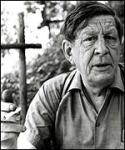 "It is already possible to imagine a society in which the majority of the population, that is to say, its laborers, will have almost as much leisure as in earlier times was enjoyed by the aristocracy. When one recalls how aristocracies in the past actually behaved, the prospect is not cheerful."
"It is already possible to imagine a society in which the majority of the population, that is to say, its laborers, will have almost as much leisure as in earlier times was enjoyed by the aristocracy. When one recalls how aristocracies in the past actually behaved, the prospect is not cheerful."-- W.H. Auden (1907-1973) --
Have a great Thursday!
Wednesday, December 21, 2005
Splash du Jour: Wednesday
 "What are the sources of an illumination? To me, they come after hours of searching and keeping my soul ready. Yet they come in a flash, as a religious phenomenon. 'The Heart is a Lonely Hunter' had such an illumination, beginning my long search for the truth of the story and flashing light into the long two years ahead."
"What are the sources of an illumination? To me, they come after hours of searching and keeping my soul ready. Yet they come in a flash, as a religious phenomenon. 'The Heart is a Lonely Hunter' had such an illumination, beginning my long search for the truth of the story and flashing light into the long two years ahead."-- Carson McCullers (1917-1967) --
Have a great Wednesday!
Tuesday, December 20, 2005
Best Books of 2005.
 Ahhh!
Ahhh!I am sipping coffee.
Currently, I am reading Carson McCullers’ 1940 novel, The Heart Is A Lonely Hunter.
It’s the latter part of December, the year is coming to a close.
In this holiday season, do you ever just sit back and think about all of the great books you have read over the past year?
I do.
This evening, after supper, I have stolen these few moments from visiting humans, to re-visit the past year in reading.
I want to mention a few of the best books I have read in 2005.
When I say “Best Books of 2005” I do not mean books that were written or published in 2005, [I find that percentage-wise, I do not read much of the current stuff] but I mean the best ones that I have read in 2005.
For example, the first one that comes to mind, was written quite a while ago, but finally read by me in 2005.
Vladimir Nabokov’s Lolita.
What an incredible book. What more can I say? Every human being should read it.
Then, I think of Peter Carey’s Oscar and Lucinda. I highly recommend it.
Another book that I thoroughly enjoyed, in the past year, was Ian McEwan’s Saturday.
Reading McEwan is always an exercise in the experience of.... superbity.
Another one that was just truly exquisite, was Matthew Pearl’s debut novel, The Dante Club.
And Jane Urquhart’s latest one, Map of Glass.
All of these were books that I savored, loved, and adored.
Along with these, a word must be said about non-fiction, which I also dabble in, from time to time. And the best thing I read all year in this genre would have to be Karen Armstrong’s memoirs.
Through The Narrow Gate and The Spiral Staircase.
It’s been a great year of reading.
But now for the best thing I read in 2005.
[.....drumroll.........]
Margaret Atwood’s Alias Grace.

If you have not yet read this book.... well, really... let me recommend it as your first New Year’s Resolution, to do so.
I welcome your comments, as to your own favorite reads of the past year.
All the best to you.
Happy Holidays!
Splash du Jour: Tuesday
And reminded me of a book I once read, called The Man Who Was Thursday.
A man who says that no patriot should attack the war until it is over... is saying no good son should warn his mother of a cliff until she has fallen.
-- G.K. Chesterton, in the novel, The Man Who Was Thursday –
Not to get too political here, but let us remember:
Readers are inclined by sensibility to look beneath the surface, to analyze and make distinctions. As Americans, we need to hold on to the freedom to make crucial distinctions, to see clearly, to think intelligently and logically, to avoid the siren songs of prejudice, ideology, nationalism and sectarianism, of simplistic and reductive rhetoric and propaganda, regardless of their source. As citizens of the world, we need to remember — as Samuel Beckett said, echoing Chekhov a century before — "in the particular is contained the universal."
-- Francine Prose --
Have a great Tuesday!
Monday, December 19, 2005
Splash du Jour: Monday
 In typical holiday fashion, I am intent upon sleeping-in like a tranquilized rhinoceros!
In typical holiday fashion, I am intent upon sleeping-in like a tranquilized rhinoceros!It's the after-effect (well... one of them) of already ingesting too much sauerkraut.
Hence, this belated Splash du Jour.
But I hope there is still enough of Monday left for me to wish you a happy one!
One of the most profoundly relevant thinkers I have ever read.
Joseph Campbell.
"Read myths. They teach you that you can turn inward, and you begin to get the message of the symbols. Read other people's myths, not those of your own religion, because you tend to interpret your own religion in terms of facts - but if you read the other ones, you begin to get the message. Myth helps you to put your mind in touch with this experience of being alive. Myth tells you what the experience is."
-- from The Power of Myth, by Joseph Campbell -- 1904-1987 --
Have a great Monday, at least what's left of it!
Saturday, December 17, 2005
Poem...
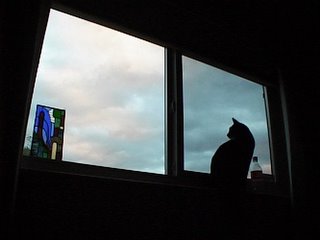 The following is an original poem. I wrote it a couple of years ago.
The following is an original poem. I wrote it a couple of years ago.It is one of my favorites.
I just ate so much food that I want to pass out.
So far, the holidays are going great!
To Catch A Cat
The cooperative ones are so adorable.
Unlike those that squint at the groping hand
in the darkness.
Staying one step ahead of your best effort
to touch them, pet them,
love them.
Masters of elusion, these will be as content
to receive your worship from behind the sofa
as when in your arms.
Don’t be like that cat, he keeps telling himself.
Would it be so bad to be caught?
Try trusting.
Would you not die nine deaths to just purr
for a reason not your own?
The sentiment is within reach, but the results
stay one step ahead of his best effort.
The work is hard.
The whole process as maddening
as trying to catch a cat
that does not need him.
© Ciprianowords Inc. 2005
Friday, December 16, 2005
SNOW du Jour: Friday
 Well, first off.... here is what was supposed to happen this morning.
Well, first off.... here is what was supposed to happen this morning.I was supposed to calmly wake up, make some coffee and post the following Splash du Jour:
Sydney Smith has been so good to us this week, that today I am going to afford him a double whammy, a Dual Splash, as it were....
There is one piece of advice, in a life of study, which I think no one will object to; and that is, every now and then to be completely idle - to do nothing at all.
-- Sydney Smith (1771 – 1845) –
He had occasional flashes of silence, that made his conversation perfectly delightful.
-- Sydney Smith, referring to Macaulay –
Have a great Friday!
_____________________________________
But.... BUT... instead of such serenity.... I SLEPT IN!
Yep!
I was MINUTES from missing my flight altogether.
Completely slept through not one, but TWO alarms. When I finally did wake up, I stared at the clock and it said 5:15.
I am supposed to BE at the airport by that time. Already checked-in, like!
The airport is on the other side of town.
Luckily, I got the World's Craziest Taxi-Driver.
When he arrived, I swore at him and he said "No worries. I have new snow tires. You watch me."
We then proceeded to run every red light between my apartment and the airport. I was helping, looking out the frosted passenger window and saying "Clear here" as he gunned the car through red after red after red.
I made it. But just barely. And by barely, I mean I forgot to wear pants!
So I am now officially on holidays!
We can go to the moon.
We can make artificial hearts.
But for the love of snow tires, can we not invent an alarm clock that not only rings, but actually hits you in the head with a hammer?
Thursday, December 15, 2005
"FRIG GRAVITY!"
Please forgive me for not writing anything erudite, witty, scholarly, dumb, outright hilarious, literary, boring, stupid, witty (oh crap, I already said that...)..... umm, basically writing ANYTHING AT ALL.
Forgive me.
It’s just that I am supposed to be catching a flight in a matter of hours, for Christmas holidays, and I have been busy packing, cleaning up around here, listening to the B’52’s, occasionally necking with Jack, and stuff like that.
Now, the "catching" the flight is not what is causing angst, in my soul. I'm old hat, at that!
The cause of my angst is the weather report.
Supposed to be a severe snow storm, rolling into town at about the same exact MINUTE that my plane is supposed to leave at 6 a.m.
It is just unfair, that’s all I am trying to say.
Could it not have snowed real heavily like say......... umm.. yesterday perhaps?
The day before that?
What about that day? The day before yesterday. Was there something wrong with snowing at least ten or eleven feet of snow on THAT day, instead of THIS day?
The day that MY plane is supposed to calmly taxi out to runway XA-4-223.6 and just........ speed up like it does, lift its nose into the air in that nice little “FRIG GRAVITY” attitude it is so prone to adopt at such speeds?
This is what I want.
I want my plane to fly the hell out of here, right on schedule.
My mother is back home right now.... cooking her wee face off.
For me.
For me to EAT all that stuff. Tons of it.
I've seen her recipes. They actually have an asterisk beside many of the items, and when you look to the bottom of the page, it says "depends on how many actual TONS of this you intend to make today...."
It is already sitting there, this food [my stomach just rumbled] and for all I know, I am going to get two or three hours sleep here, call a cab and pay the guy at least $900.00 to drive me to the airport terminal where some dude or dude-ette at the checkout counter is going to look at me and say “Sorry. Lotsa snow. Gravity wins.”
GRAVITY SHMAVITY!
I’ve got Christmas food waiting for me, and I only have an alotted ten days to eat it!
Now let’s get this show on the road.
We can go to the moon.
We can make artificial hearts.
For the love of cabbage rolls, can we not invent an airplane that has a retractable shovel on the front of it, to push the snow out of the way as it takes off on time?
Splash du Jour: Thursday
I cannot help but think that what he meant by that, is similar to this, that our Mr. Smith said, a century and a half earlier. (I say similar, because there are so many variations on what the word “success” means)...
Whatever you are by nature, keep to it; never desert your line of talent. Be what nature intended you for and you will succeed.
-- Sydney Smith (1771 – 1845) –
They are wise words.
Campbell’s words and Smith’s words.
Very wise words.
Have a great Thursday!
Wednesday, December 14, 2005
The Penelopiad.
 I am again at Starbucks, and again, it is so cold out.
I am again at Starbucks, and again, it is so cold out.How do stray animals, and stray people, stay alive out there?
Tonight I am thinking of Margaret Atwood’s The Penelopiad, a book I read just prior to Kundera’s Identity.
This book was sent to me as a gift, from a friend who is well aware of how much I love Margaret Atwood’s writing. Since I am such an avid fan, I realize my perception of this book may be a bit biased. It is just that I am now even more convinced that Atwood cannot help but continue to not write badly. [<-- Unlike that very sentence there!]
She is so good. And I loved this latest book of hers. It is part of the Myths Series, (initiated, I think, by Knopf) which will include books by various well-known authors, each focusing on a re-telling of some ancient myth. For instance, Jeanette Winterson has already completed one entitled Weight, the myth of Atlas and Heracles. And Karen Armstrong’s A Short History of Myth is also already available.
This one by Margaret is a bit of a different slant on the myth of Penelope and Odysseus.
Other than watching The Simpsons fairly regularly, I know very little about Homer, so, as I picked up this book (unwrapped it really) I felt like... “D’oh! I am not gonna understand this thing!”
I have never read The Odyssey.
But the neat thing is, I found that you do not have to know much about The Odyssey in order to really enjoy this book. The brief Introduction itself furnishes enough background to get right into the midst of the story before you are finished even the first brief chapter.
Most readers will at least be familiar with the story of the beautiful Helen of Troy (Penelope’s cousin) and how she is finally liberated by Brad Pitt. Well, when Penelope’s husband Odysseus (reluctantly) leaves Ithaca to join in the fracas involving this Trojan War, he stays away for twenty years.
And Penelope is left behind, to tend to the affairs of state and the state of affairs.
During this time, men are pretty much crawling out of the woodwork to try and win her hand in marriage, everyone presuming that Odysseus is long since dead.
For decades, there is no word from him. Only legends, rumors, contradictory reports as to his whereabouts. It's the ultimate “he went out for a pack of smokes and I haven’t seen him since” story.
Penelope has always been lauded as the epitome of unwavering faithfulness, patiently waiting for Odysseus to return to her.
Drawing on material other than Homer’s Odyssey, Atwood has chosen to tell the story of this interim period from the perspective of Penelope herself. Along with this first-person story, Atwood has placed alternating sections where Penelope’s twelve maids share their story also. These twelve were hanged until dead by Odysseus and Telemachus (father and son) upon the former’s return to Ithaca.
From the narration standpoint, it is from start to finish a tale from beyond the grave, as Penelope tells us, in the opening sentence “Now that I’m dead I know everything.”
Atwood tells us in the Introduction that there are two questions which are raised (and unanswered) after anyone reads Homer’s Odyssey. These are: what led to the hanging of the maids, and what was Penelope really up to?
She says, “The story as told in The Odyssey doesn’t hold water: there are too many inconsistencies. I’ve always been haunted by the hanged maids; and in The Penelopiad, so is Penelope herself.”
This little book pulls back the curtain on an important portion of mythic history.
No one can do it better than Margaret Atwood.
[T.yL.i.I.]
Splash du Jour: Wednesday
Tuesday, December 13, 2005
Identity Crisis!
 I am sitting at Starbucks after work (big surprise).
I am sitting at Starbucks after work (big surprise).It is soooooo cold out.
But this coffee is soooooo good and warm.
It thaws the innards just right!
If they would only turn down the Christmas music a bit, everything would be perfect. Why do they insist on playing this music about sleighrides and bells so LOUD that you feel you are getting repeatedly kicked by the Clydesdale that is pulling the thing along....
“....dashing through the snow...”
Yes, all right! But turn it DOWN!
I just finished reading a great book. Well, last night I did.
Identity, by Milan Kundera.
[Sounds like a new perfume.... Identity, from Milan K.]
It is the first thing I have ever read by this author and it was definitely good enough to make me interested in reading more Kundera stuff. And even maybe getting the perfume.
It is short. It moves along well, gathering speed as it goes. But the ending.... umm... well, more about this in a bit.
To simplify (greatly) I want to say that the novel speaks forcibly regarding what can happen when someone delves into the deep intimate inner spaces of another, uninvited.
What happens when certain “privacies” are violated. In a word, it can be tragic. Even in the case of two people who are enjoying a healthy relationship, in all other respects. As is the case with our two main characters in this story: Jean-Marc and Chantal.
They are a loving, mutually devoted, intellectual couple. After the death of her five-year old son, Chantal left her husband to be with Jean-Marc. They met at a ski-lodge. They enjoy a somewhat bohemian lifestyle, filled with lots of restaurant dates and two-sided philosophical conversation.
Everything is sort of tickety-boo, until Chantal reveals to Jean-Marc her specific inner angst.
“Men don’t turn to look at me anymore,” she says.
At first, this very much puzzles him. Why should such a thing matter?
“Is that really why you’re sad?” he asks.
[There is a God! They just took that wretched music off and are playing some real mellow stuff now...]
Jean-Marc is confused because.... well, shouldn’t it be enough that he himself is enthralled with her? That he chases after her?
But Chantal has spoken what was in her mind.
And now it’s... out there.
What will happen?
What will Jean-Marc do, with this information?
He also tends to be going through some “identity” issues, (Chantal earns five times as much money as he does, and this bothers him) although he is not quite as debilitated as she is, at the current time. Or so it seems, at least.
I really do not want to say too much about what happens, because well, there is no way of saying much more without really spoiling things for someone who has not read the book. And I want you to read it. Maybe I’ve said too much already.
So I’m going to just shut my yapper now.
No, just one more thing.
The story makes me ask myself: Is it possible to know too much about someone you truly love?
My answer is YES.
Should each person in the relationship be allowed their secrets?
My answer is YES.
Allowed some privacy?
My answer would be... Most Definitely.
Oh yes. The ending of the book.
A bit of a disappointment for me. Both in the structure of the ending, as well as the summation itself. A little too abrupt, inconclusive, contrived, and confusing, for me.
And I mean, an ending is darn important. Darn tootin.’
But for the enjoyment of the subtleties of the rest of the book, and the gorgeous language (even in translation) throughout, I would still highly recommend it.
My copy (the Faber & Faber, shown above) is only 153 pages.
If it was 800 or 900 pages and had the same ending? Yes, I would have kicked the nearest innocent stranger right in the shins!
Splash du Jour: Tuesday
You must not think me necessarily foolish because I am facetious, nor will I consider you necessarily wise because you are grave.
-- Sydney Smith (1771 – 1845) –
Have a great Tuesday!
Monday, December 12, 2005
WALLS: Part 3
Today will be the final installment of the thrilling series entitled WALLS.
Henceforward, to be immortalized in history as... The WALLS Trilogy©
It amounts to a rare (extremely rare) glimpse at some of the paintings that adorn the bookpuddle lair.
These two that I will reveal today, stand sentinel above The Sacred Desk of Writing.
I am able to look up to them for inspiration, whenever I am at the computer.
The first one shown here, is of the Starbucks siren, and it says Passion makes perfect.
 Some people may ask... umm... what exactly is a siren?
Some people may ask... umm... what exactly is a siren?Well, here is a good example of one, below:
 See, it’s sort of like a mermaid, but different.
See, it’s sort of like a mermaid, but different.Whereas a mermaid is simply a rather docile mythical sea creature with a woman’s head and trunk and fishlike tail, a siren goes the extra mile and lures sailors to destruction with her seductive singing! She is a mermaid that is dangerously alluring or seductive. A fishy little temptress. Note that her tail is (ahem!)... split in two, sortalike!
Also, sirens have the added feature of wings.
It is interesting that the original Starbucks logo had to undergo revision because some customers felt that the suggestive split tail of the inaugural topless siren was too lurid. Too sexually suggestive.
So, the image was cropped and enlarged so that the splitness would no longer show.
Plus, she underwent a serious breast-reduction.
Nowadays, what was originally a tail, sort of looks like a mass of Debra Messing’s hair curling back in on itself.
Here is the progression (or regression) that took place, shown below. The last image is the current one, circa 2005.



And now, for my last Starbucks picture. Pretty self-explanatory. 
The two pictures somewhat face each other. In the corner of the wall, they are adjacent to each other.... it is hard to explain.
You will have to actually visit the lair, in order to get the full effect.
So come over.
We will sit and have coffee and conversation.
About books.
Passionately.
Splash du Jour: Monday
So, all this week, I am going to be Splash-du-jouring several pithy witticisms from this great witmaster.
Have the courage to be ignorant of a great number of things, in order to avoid the calamity of being ignorant of everything.
-- Sydney Smith (1771 – 1845) –
Have a great Monday!
Sunday, December 11, 2005
WALLS: Part 2.
First, before showing you one or two more of my Starbucks© wall-pics, I must take a moment to tell you of something awesome I saw on the way over here (to Starbucks) today.
Along the way I always pass a really neat bookstore that has a signboard out front, on the sidewalk. There will always be a book-relevant quotation on the thing, written in chalk.
Today’s quote said “Wear the old coat and buy the new book.” – Austin Phelps.
Hah!
I LOVE it!
Finally, a justification for my shabbiness!
It is so true. I would MUCH rather buy books than clothes.
I do not part with money easily, and for clothing, I find the separation especially painful.
But for books? The wallet falls open, oh so easily. So easily the cards fall forth, and are happily swiped, in exchange for yet another book added to my “To Be Read” pile!
OK, the WALLS.
I know, you are on the very edge of your seat. Never have you read of something more exciting....
Here is another of my favorites.
 “The discovery of coffee has enlarged the realm of illusion and given more promise to hope.”
“The discovery of coffee has enlarged the realm of illusion and given more promise to hope.”
I have tried to find out more about the man who said these words. His name is Isidore Bourdon. Even my home encyclopedia is silent, about him. All I have been able to muster is the following scant mini-bio-blurb:
The physician Isidore Bourdon (1796-1861), born at Merry in the Orne département; member of the Academy of Medicine.
Similarly, the scene on the painting is elusive. Suggesting an illusion, the present (in the foreground) being blended with the past, as the people in the picture get severely high on coffee.
In the background we see the words “Café Eras.”
All I have been able to dig up is a reference to a certain café having “a good mixture of 'cafe eras'” which leads me to believe that “café eras” is a term denoting the actual ambience or atmosphere of an establishment, rather than being the name of the specific establishment itself.
I’m sure that someone reading this will be able to further enlighten me as to the meaning of the phrase, en francais.
Next is one of the pictures in my actual boudoir, as it were.... Much more to the point.
Much more to the point.
I love the New-Agey feel of it.
Looking at it right now makes me descend the stairs here, to ask my barista to make me another café americano.
************
Saturday, December 10, 2005
WALLS: Part 1.
To bring into the loop those of you who did not read my previous mentioning of this.... habit of mine... it consists of my simply asking the Starbucks people if I can have some of their nicer store posters when it comes time to dispose of them.
They used to be very generous and obliging with me.
They are not so, anymore.
When I inquired as to where this “cold shoulder” approach to their own garbage has come from, it was explained to me that several people had been doing what I do, and then SELLING the ill-gotten artwork on places like e-Bay and whatnot.
“Really?” I exclaimed, and added, “I assure you that my intentions are more devoted, more sincere, more honest, less..... lucrative, more....... desperate!”
But to no avail.
There is no swaying a dedicated Starbucks barista.
Official policy is that they no longer are allowed to give their promotional posters away.
So I have taken to stealing them.
No, just kidding.
The ones I will show here are old old ones, gotten about a decade ago, in the heyday of less stringent restrictions. [I blame 9/11 for these new unreasonable measures, really.] They appear on EVERY wall of my apartment. I got them professionally laminated so they are like actual paintings you would buy at an art store. Or... on e-Bay.
Here at Puddle-Headquarters, everywhere you look, you see the Starbucks logo. My goal is one day to have one of the round green signs....
 Then, yes.
Then, yes. The tattoo on the forehead.
I know. I have issues.
I really do.
The first work of art I am revealing here on bookpuddle, is my favorite one. It is this portrait of the great English curate, Sydney Smith.
In case you cannot make it out, he said: “If you want to improve your understanding, drink coffee.”
My God, that is good preaching.........
 I have just done some research this afternoon on the personage himself. He is an incredibly fascinating character, and so witty.
I have just done some research this afternoon on the personage himself. He is an incredibly fascinating character, and so witty.He lived 1771–1845, and was an English clergyman, writer, and wit, ordained in the Church of England in 1794. In 1798 he went as a tutor to Edinburgh, where he studied medicine, occasionally preached, and with Jeffrey and others founded (1802) the Edinburgh Review. His brilliant contributions were a strong factor in the periodical’s success. Moving to London in 1803, Smith lectured on moral philosophy at the Royal Institution and became a well-known figure in literary society. His “Peter Plymley” letters (published anonymously in 1807–8) in defense of Catholic Emancipation were the first of his many appeals for religious toleration. Oh, I love that. Religious toleration. Preach it Sydney old boy!
In 1809 he moved to Yorkshire, where he landed a job as a pornographer’s apprentice. No, seriously, I made that up. Disregard that statement.... I just said it to make sure you are paying attention. Where did I leave off? Oh yeah.
In 1809 he moved to Yorkshire [land of pudding?] where he had been given a living of £500 a year. [That’s a lot of dough, for back then. The guy was not hurting financially].
There he also acted as magistrate and village doctor. He went to a parish in Somerset in 1829; in 1831 he was given a residentiary canonry at St. Paul’s. Later in life, he inherited 50,000 pounds [that is VERY heavy] when his brother something-or-other died and left it to him.
Smith’s religion was strong and of a practical nature. A lover of justice and truth, he was a life-long defender of the oppressed. His failure to rise higher in the church is attributed to his wide reputation as a master of wit and satire. He is placed among the premier English wits and has been compared to Swift and to Voltaire.
I accumulated the following little witticisms of this fascinating man. Aren’t they awesome?
Among the smaller duties of life I hardly know any one more important than that of not praising where praise is not due.
Madam, I have been looking for a person who disliked gravy all my life; let us swear eternal friendship.
Never talk for half a minute without pausing and giving others a chance to join in.
No man can ever end with being superior who will not begin with being inferior.
Thank God for tea! What would the world do without tea? - how did it exist? I am glad I was not born before tea.
What you don't know would make a great book.
All in all, I am proud to have this guy against the wall! [so to say].
Stay tuned.
I will be showing you more of my interior decorating skills........
Friday, December 09, 2005
In The Name of Identity.
 As I sit here in Starbucks, sipping a coffee, there are four people in Iraq awaiting almost certain execution.
As I sit here in Starbucks, sipping a coffee, there are four people in Iraq awaiting almost certain execution. Right now. They are alive. Right now. Right this minute, they are waiting.
Their immediate crime is that they have travelled to that country on a peace mission, in an effort to help the people there in any way that they can. One American, a Briton, and two Canadians. Their scheduled execution has been postponed to sometime early tomorrow, and any chance of rescue or reprieve is highly unlikely.
The captors probably fully realize the blatant innocence of these four people. They are only carrying out this action to make a point, a point that has nothing to do with the four people PERSONALLY. These prisoners represent, however, a leverage point.
A way of getting a point across. A way of making demands.
They will pay the ultimate price for this point, and for these demands.
I have no intention of making any statements here about the rightness or wrongness of the situation in Iraq (in general). It is far beyond me to know the details.
But the above mentioned real life / real death situation, playing itself out right now as I type, has me thinking of an amazing book I read a while ago.
It’s called In The name of Identity: Violence and the Need to Belong. It’s written by Amin Maalouf.
Early on, the author tells us, "All the massacres that have taken place in recent years, like most of the bloody wars, have been linked to complex and long-standing 'cases' of identity." (p.33).
The need to belong.
The need to identify with a certain group, be it ethnical, linguistic, racial, political, or religious.
The main reason I think so highly of Maalouf’s book is that I feel it accomplishes exactly what it sets out to do, which is not so much to change the world, as to set out prerequisites for change, and to theoretically elucidate and practically illustrate why the world is in the shape that is in today.
"What shape is that?" you may justifiably ask.
"Misshapen," Maalouf might answer. "Distorted."
Not what it ought to be. And more importantly, not what is could be. This is not a book about despair, or about resignation to fate. It is not a backward look at problems, but a forward glance, a look into the author's sense that "the future will be what we make it." (p.98). It speaks to the responsibility inherent in all of us, no matter who we are, no matter where we live, to begin to identify with a concept of planetary solidarity, as opposed to regional and ideological exclusion.
I think it would be safe to say that Maalouf argues that such a radical paradigmatic shift is not only essential to the maintenance of "humanity" it is also the only thing that can ensure our very survival.
I challenge anyone who does not agree with Maalouf's emphasis upon the importance of identity, to read any one chapter of this book, and then pick up any major newspaper of our day and age. Better yet, turn on the evening news, tonight. Sad to say, but this book is front page news... every damn day! In its PRE-9/11-ness, (written in 1996) this book is a prophetic scroll unearthed. Hence, in its POST-9/11-ness, it is impossible to exaggerate its importance.
For me, a great benefit of reading the thing, was to see the history of Christianity and Islam in a way that I had never considered before. Wow!
Also, while not being in any way an outright condemnation of democracy, Maalouf outlines several reasons why the West's unquestioned veneration of democracy ought to be tempered with a realization that there are vantage points other than (and higher than) Mount McKinley's, from which Western ideals are looked upon, by other people of this earth.
One of the most crucial questions this book forces the reader to ask themself is this: "To what extent is the global culture, as it develops daily, essentially Western or even specifically American?" (p.114).
This is a short book. Easily readable. You will enjoy it, trust me... you will wish he wrote more, not less!
You owe it to yourself, if you are a thinking person, to think about reading this book. And then, after thinking about it, do it.
"Life is a creator of differences." (p.20).
"I dream not of a world where religion no longer has any place but of one where the need for spirituality will no longer be associated with the need to belong." (p.96).
I can't dream of a worthier dream being dreamed by any dreamer.
Peace.
Somehow... somehow, and I know not how... but I ask it anyway, wish it, will it... peace be with those four tonight.
Splash du Jour: Friday
 Since tomorrow is a Saturday, it will be a Splash du Jourless day!
Since tomorrow is a Saturday, it will be a Splash du Jourless day!But I would be remiss in neglecting to draw your attention to the birthday of one of the greatest poets of all time.
Emily Dickinson, born on Dec.10th, 1830 in Amherst Mass., turns a cool 175 years young tomorrow. She once said, “If I feel physically as if the top of my head were taken off, I know that is poetry.”
Here is one of hers.
It is a fine example of her terse, economic, get-to-the-pointness...
Heaven is what I cannot reach!
The apple in the tree,
Provided it do hopeless hang,
That “heaven” is to me.
The color on the cruising cloud,
The interdicted ground
Behind the hill, the house behind, --
There Paradise is found!
-- Emily Dickinson (1830 – 1886) –
Have a great Friday!
Thursday, December 08, 2005
Sharing Our Passion.
 I’ve been sleeping with Jack a long time now.
I’ve been sleeping with Jack a long time now.Every night.
So far, things have been strictly platonic.
But that’s not to say that either of us lacks passion in the night-time.
No, there’s plenty of that.
Here is what happens each and every night.
Firstly, I stay awake much too late.
I read, and putt around, and put off bedtime because I am so seldom really tired at night. I think I inherited this trait from my father. He was a real nightowl.
I will usually be at my all-purpose desk/table, in computer-glow and candlelight, either reading or writing something. And Jack will be curled up in his amazon.com box next to me, on his own little table where I have strewn a hodgepodge of papers and books.
Sooner or later, I realize that I must sleep, like it or not.
When I finally do hit the hay, I usually go in face down. And not really face down but sort of to the side a bit, with my left arm under the pillow, and my hand protruding out into Jack’s side of the bed.
Jack.
Like clockwork, about three or four minutes after the lights are off, he lightly jumps onto the bed as though he is concerned about disturbing me. And as he does so, there is this sound emitted, like I guess it would be a rush of air through his tracheal purr-apparatus... an impossible sound to spell, but maybe “pthrrrrrr” would be close. And it quivers sort of, almost like he is giggling real quiet and quick.
He then moves very tentatively, like he’s walking on waves, and he makes his way over to where my hand is. And he sets himself down, right there.
So, when I just lift my hand a bit, he gets right in under it and I rough him up. I scratch his head, his ears, and even the front of his face. Then I just do nothing and let him tell me where he needs a good scratching. [What I like to call, “a good rubbinz.”]
He’ll twist his head around, as though saying “There. Oh yeah. Right there dad!”
And he purrs like a Ferrarri.
He also kneads.
What is it with cats, that they have this need to knead?
As Jack purrs away, he will knead the bed as though it is a big pile of dough.
Knead.
“To mix and work (dough, clay, etc.) into a uniform mass, usually by pressing, turning, and pulling with the hands. To work upon by thumps or squeeze of the hands; massage.”

That is what Jack is doing.
He is massaging the bed. And sometimes, me.
He will dig and dig like that, and sometimes he will end up kneading my arm.
He is not declawed, and he is pointy as pins.
Parts of this rather expensive damask comforter I currently have on my bed are ruined. Partially shredded by Jack’s insatiable night-time kneads!
Occasionally, one night in ten, the three or four minutes will go by... and I will be lying there... but Jack will not do his little giggly jump onto the bed.
So I lay there. And I worry.
The lack of Jack reminds me of how not tired I am.
So I get out of bed and look for him.
In a two-room apartment, he can’t have gone far.
There he is.
I stand there like an idiot in underwear.
He looks up at me with those blues of his, and meows “So if I want to spend one night on the couch there’s something wrong with that?”
I stare him down.
Then I turn away, and, sure enough, he follows me.
In the end, what I’m mistaking for a renewal of affection is probably moreso along the lines of the following thought in Jack’s cat-mind.... “You know, he is pretty good with that food dish. I don’t wanna screw that up!”
But I don’t really care. I don’t care what he is thinking. I just want him in bed with me.
And soon there I am, with my arm outstretched. And there he is, doing his little Dance of the Pointy Paws.
And I finally fall asleep, humbled yet again by the fact that I need my cat more than he kneads me.
Splash du Jour: Thursday
 It did not occur to me that I might be a writer until I flunked out of my first year as a chemistry major, and found work as an apprentice writer of Volkswagen ads.
It did not occur to me that I might be a writer until I flunked out of my first year as a chemistry major, and found work as an apprentice writer of Volkswagen ads.-- Peter Carey –
Having recently read his 1998 Booker Prize winning novel Oscar & Lucinda, I am grateful for the above mentioned serendipitous occasion.
Have a great Thursday!
Wednesday, December 07, 2005
Fumes.
By that, I mean that I do not do mornings well.
If mornings could just be postponed to like... mid-afternoon, or even just moved to the evening, I’d be totally on track.
At night I am never tired. But mornings? Always.
Today was no exception. By the time I actually got out of bed I was in a rush (again). I had a shower while coffee was brewing, and then ran out the door. [Well, after putting clothes on.] But I was in such a hurry that I did not even spritz myself with my special cologne.
I was totally cologneless.
But the hallway to the elevator was positively swimming in cologne. My neighbor must have left his place just before I did. He really packs on the cologne, the guy. It’s nice stuff, really. So I waited for the elevator, forcibly breathing him in.
When I got in the elevator (I am on the top floor) the only change in the wafting scent was that here it was more concentrated. WOW! It was powerful.
This was obviously the same elevator (we have two) that my cologne-sporting neighbor had just used.
I sipped my coffee.
The elevator stopped at about the tenth floor.
In walked a woman. I smiled at her, and her at me.
She is very attractive. Oriental. I see her all the time because her car is parked only a few stalls over from mine, in the underground parking garage.
I’m not one for small talk, really. We both know that the weather is horrid today. So I just stare at the wall, the door, rather, in front of me. As does she.
I sip my coffee...
But then, just as we reach about ground level and have only that extra ten feet to go, she turns to me and says, “Your cologne is lovely.”
My God!
What could I say? I had to say something!
In that split second, I panicked! My brain spazzed. I was short-circuiting.
Am I supposed to now tell this dear woman that it is another man ravaging her nostrils? Am I to attribute this wonderful odor to someone else? Am I? Should I?
.......... hell no.
“Thank you,” I said, with a bit of a wink, as the doors opened.
We stepped out. We’re going pretty much to the same place.
I made sure that she walked ahead of me, so as not to disillusion her. I didn’t want to startle her with my umm... SPENF. [Sudden Post-Elevator Non-Fragrancy.]
And on the way to our cars, I couldn’t help but notice that her own perfume was absolutely heavenly.
Heavenly.
She obviously does mornings a lot better than I do.......
Splash du Jour: Wednesday
 "Looking back from the year 2100, we'll see a period when our creations -- technological, social, ecological -- outstripped our understanding, and we lost control of our destiny. And we will think: if only -- if only we'd had the ingenuity and will to choose a different course. I'm convinced that there is still time to muster that ingenuity and will, but the hour is late."
"Looking back from the year 2100, we'll see a period when our creations -- technological, social, ecological -- outstripped our understanding, and we lost control of our destiny. And we will think: if only -- if only we'd had the ingenuity and will to choose a different course. I'm convinced that there is still time to muster that ingenuity and will, but the hour is late." -- Thomas Homer-Dixon --
Have a great Wednesday!
Tuesday, December 06, 2005
"The Sky Is Falling...."
 Well, in honor of the new re-release of that classic apocalyptic story.... Chicken Little.... my thoughts today turn to a really great book I read a while ago.
Well, in honor of the new re-release of that classic apocalyptic story.... Chicken Little.... my thoughts today turn to a really great book I read a while ago.The Ingenuity Gap, by Thomas Homer-Dixon.
Since I am sitting here at Chapters, drinking coffee as though the end-of-the-world is scheduled for later this evening, I took a little stroll and picked this book from the shelf, and am revisiting its ominous contents....
The author, who is Director of the Peace and Conflict Studies Program and Associate Professor in the Department of Political Science at the University of Toronto, states his purpose in the Prologue:
"In this book I'll argue that the complexity, unpredictability, and pace of events in our world, and the severity of global environmental stress, are soaring. If our societies are to manage their affairs and improve their well-being they will need more ingenuity - that is, more ideas for solving their technical and social problems. But societies, whether rich or poor, can't always supply the ingenuity they need at the right times and places. As a result, some face an ingenuity gap: a shortfall between their rapidly rising need for ingenuity and their inadequate supply."
After reading this book in the spring of 2003, I believed the above premise-statement to be very true. [To have much truth value.] I recall e-mailing the author and receiving a prompt reply. We dialogued a bit about some specific questions I had at the time, and he was very gracious and knowledgeable.
I still believe him. I believe the basic argument of this book. It is very convincing, and it is (what seems to me) an unbiased look at the real situation facing our planet not only environmentally, but socially, and economically.
Homer-Dixon has travelled the world, exploring the situations that give rise to the "ingenuity gap". Partial exposure to the world (Western prosperity etc.), can lead us to adopt misinformed and unrealistically optimistic conclusions about how we will manage future difficulties. This book takes off the rose-colored glasses we may be wearing, exposing us to some harsh UV rays of reality!
Can the world be sustained by solar energy?
This books says NO!
In 1960 the income of the richest 20% of the world's population was 30 times that of the poorest 20%.
In 1998, it was 82 times greater.
Let this book educate you to the coming problems that are likely to result from this increasing (and unchecked) economic disparity. Wow, it is sobering.
 All of this is startling, but nowhere is the ingenuity gap more disturbing than in the problems related to the environment.
All of this is startling, but nowhere is the ingenuity gap more disturbing than in the problems related to the environment. There are existing challenges that we can barely understand, let alone address. We've all heard about the greenhouse effect. Global warming. Blah,blah, blah! Right? Ozone layer, big hole... big deal! Seriously, even the term “global warming” can sound like something we might want to welcome, at times! Am I right?
“Hey! Are you heading down to the beach this weekend?”
“Nah. Forecast says it’s going to be a bit chilly out.”
“Hmmm. Well. We can always hope for some global warming!”
Maybe that could get a laugh in some standup sketch. Or on a blog. But when we say that this "warming" factor could change the earth's overall temperature by 2 degrees, we should remember that the difference between today's climate and the coldest period of the last ice age, is only about 5 degrees!
I mean, get out the Gore-Tex! This is serious stuff.
Population?
Between 1960 and the year 2000, the population of the world has doubled! Currently, if everyone were spread out across the habitable land of the earth, we would all be within calling distance of each other (about 100 metres apart, in every direction). This is sobering.
Homer-Dixon travels the world within the pages of this book. This guy is really collecting the Air-Miles! He lets us tag along: through North, Central, and South America, Europe, Asia, India. The reader might as well be a piece of carry-on luggage! He puts together a very eloquently written synopsis of the challenges that mankind faces. And there are portions of this book that [written prior to the events of Sept. 11, 2001] are just downright PROPHETIC!
The book is divided into four parts/sections, which are presented as questions.
1. How Are We Changing Our Relationship To The World?
Dramatically! Between 1/3 and 1/2 of the planet's land area has been fundamentally transformed by our actions. (p.54) Let's not even get into what we have been doing to the oceans! (But he does).
2. Do We Need More Ingenuity To Solve The Problems Of The Future?
Yes! If we were to know the true state of our situation, we would feel the sort of panic one feels when strapped into an out-of-control jet liner on its way to a crash-landing. (I'm extrapolating/summarizing here).
3. Can We Supply The Ingenuity We Need?
Probably not. It is theoretically possible, but unlikely, given the current rate of gap widening set against the boundaried limitation of our brains. It is much easier to create certain problems than solve them.
4. What Does The Ingenuity Gap Mean For Our Future?
It means we ought to be in favor of getting our act together.
So... not exactly a book to stuff in Grandma's Christmas stocking over the mantle this December... but one that every thinking, concerned, person-that-thinks-they'll-be-around-for-a-while ought to read!
My favorite line? "Climate is an angry beast, and we are poking it with sticks."
Splash du Jour: Tuesday
 A novel, like a myth, teaches us to see the world differently; it shows us how to look into our own hearts and to see our world from a perspective that goes beyond our own self-interest. If professional religious leaders cannot instruct us in mythical lore, our artists and creative writers can perhaps step into this priestly role and bring fresh insight to our lost and damaged world.
A novel, like a myth, teaches us to see the world differently; it shows us how to look into our own hearts and to see our world from a perspective that goes beyond our own self-interest. If professional religious leaders cannot instruct us in mythical lore, our artists and creative writers can perhaps step into this priestly role and bring fresh insight to our lost and damaged world.-- Karen Armstrong --
Have a great Tuesday!
Monday, December 05, 2005
Splash du Jour: Monday
 I have it on good report that Joan Didion’s recent memoir entitled The Year of Magical Thinking, ["You sit down to dinner and life as you know it ends"] is definitely worth reading.
I have it on good report that Joan Didion’s recent memoir entitled The Year of Magical Thinking, ["You sit down to dinner and life as you know it ends"] is definitely worth reading.Today, this brilliant novelist, essayist, and interpreter of the American experience celebrates her 71st birthday. She was born in Sacramento, California – 1934.
To have that sense of one's intrinsic worth which constitutes self-respect is potentially to have everything: the ability to discriminate, to love and to remain indifferent. To lack it is to be locked within oneself, paradoxically incapable of either love or indifference.
--- Joan Didion ---
Have a great Monday.
Sunday, December 04, 2005
My Own Little Anthem.
It is now the late afternoon and I have decided to hit the freeway and drive here to a Chapters/Starbucks that I rarely ever visit. It is bustling with the sounds of commerce. The Christmas music is in full blare, interspersed with the occasional little blast of U2 or Louis Armstrong. Starbucks like to really mix it up. I don’t mind the eclectic mix so much, but I do wish they would tone it down a notch.
I am sitting at this one bench style desk-affair (oooh, more U2 overhead), and it seats four, one extra person is even at the oblong end there, so we are at full capacity. The guy next to me (as I glance over) is doing some sort of mathematical formulation that looks so complex it is making me dizzy.
These two “yoots” (to quote Joe Pesci from the movie My Cousin Vinny) just sat down, opposite me. He went to get some coffees while she pulled a book entitled On Acting by Sanford Meisner out of a backpack and immediately started reading it at about midpoint. Now he has sat down next to her and is also reading something, hiding the title from me because he may be on to the fact that I am writing about the both of them. Anyway, I just love to see two people reading together, and that is the only reason I am mentioning it. Because I love it so much.
Today is my birthday.
I have turned 24.
Whoopsie daisy! Bit of a dyslexic moment there!
If you switch those two digits around, it is much closer to the musical truth.
So it is that I think of the following poem, today being the 42nd anniversary of the first stanza's subject matter.
I wrote this thing about two years ago.
Several people who have read it have afterwards just sort of levelled a blank stare at me and suggested with their silent eyes that I perhaps could use some Vitamin B12 supplements.
Yet, to me, it is one of the favorite pieces I have ever written.
Maybe by next December I will have done something better, to displace this little thing as my own personal anthem.
But as for now, it is.
Diameter
There exists a precise area on this planet
the exact length of a sputtering infant
where tiny lungs drew for the first time
air, and I was born.
Forty years later I seek its diametric opposite,
the furthest earthly point from that first breath.
Perhaps it falls upon the ocean.
I float there, and as I pass the spot
rest my hand on the black surface,
look up at the stars and imagine
my life a sword that splits the world in two.
Perhaps it is a terraced plot of dirt.
An aged farmer quietly tills his garden
while I kneel and grip the soil,
look up and try to impress upon him
the importance of this little row of beans.
© Ciprianowords Inc. 2005
Saturday, December 03, 2005
Bird by Bird.
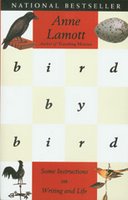 Bird By Bird.
Bird By Bird.Ornithologists be warned: Strangely enough, it has nothing to do with birds!
I just recently read this unconventional book about writing, by Anne Lamott.
I remember seeing a review of it, where the reviewer commented: This is Anne Lamott, for heaven's sake...and that means it's funny!
I agree, and this being the only Lamott book I have ever read, I did not know ahead of time it would be this funny, so that was a pleasant surprise. It is indeed, quite humorous, in a self-effacing and irreverently honest sort of way.
I like funny.
I believe there is always a place for funny.
Well, wait a minute, that is an exaggeration.... [there is not one thing funny about several peacekeepers right now this very evening awaiting certain execution in Iraq, for instance] but what I really mean to say is that there is very seldom a topic or situation that cannot be enlivened and enhanced, or “brought home to the reader” through the use of well-placed humor.
In this, Lamott is a true artist. Her humorous approach to this topic of writing and the writer’s life, makes me want to go on and read her other books about faith and the religious life. How badly (in my opinion) we need a bit of laughter injected into any relevant discussion of these topics, in order for them to make sense at all.
What impressed me the most about Lamott’s book, was how she simply and gently advocated several practical ideas that, in combined dosage, could really unleash the writer within me. Reading (and believing / absorbing) this book is like granting yourself a license to write!
We all have a story to tell, Lamott says (I am wildly paraphrasing). She encourages us to not set out to be writing War and Peace if we are merely trying to record the details of a childhood experience. Or trying to write a humorous story about Uncle Fred’s obsession with tractors and other farm machinery. Or writing a wee story about a family that has wild body odor.
JUST WRITE, she says. If you want to write it, then that is what makes it important to do so!
And as you do it, you will develop your art and broaden your appeal in a way that means more and more people may be interested in reading and appreciating what you write!
But the key is... WRITE.
One must write, in order to be read.
So it is that she entitles one chapter “Shitty First Drafts” and follows it up with one called “Perfectionism”. In these chapters she is directly addressing some of the major things that have hindered my own writing, at times. It is this desire to write the perfect thing in the first go-around. Lamott says this is a killer.
She tells us that “Almost all good writing begins with terrible first efforts.You need to start somewhere. Start by getting something – anything – down on paper.”
This is so good. This is so important. It is a validation, from a successful writer.... to JUST WRITE. To not worry (yet) of how your reader will be reading it.
All of the revisionary stuff comes at a later point.
Oh, if I could learn this!
Some other extremely practical [useful] advice is found in the chapter nakedly entitled “Index Cards”.
It’s about index cards.
Lamott encourages writers to follow her own example of keeping a healthy stock of index cards, or some such readily available writing material nearby at all times.
What she is doing here is really asking me to revise my own writing-on-everything-in-the-world-including-paper-napkins-and-my-own-hand-and-arm method.
I am the Scrap Piece of Paper King. I have inadvertently thrown many a great idea into the washing machine, trapped in the pockets of my jeans. Or I will write on my own right hand (I’m a southpaw) some kind of scribblage, and then avoid taking a shower for a few days because I don’t want to wash off this great idea!
I should buy some INDEX CARDS or something.
The chapter on “Dialogue” was fabulous. If your characters are going to be “real” at all, they better talk “real”. Then there is the danger of overusing regional dialect, oh this is important, methinks.
Thez mebbe nuthin’ what’s moh ‘mpotant than thett theh ‘dvice! Am I right Uncle Dad?
What do people mean when they continually make note of the fact that Lamott is irreverent? You see this comment everywhere. Well... it is just that she laces everything that she says with stuff like this: I worry that Jesus drinks himself to sleep when he hears me talk like this. (p.170).
Or, her explanation of what the radio station call letters “KFKD” stand for (p.116).... [you must read it for yourself, as this blogpage is only rated PG-13.]
I find it wonderfully delightful, this kind of constant witticism.... this constant poking at seriousness with sticks of humor.
But yet, it is done well. It fits!
In other words, it is NOT like watching an episode of Gilmore Girls.
One of the greatest things I have gleaned from this book is that writers do not (should not) write simply in order to be published. If you are a writer, you will write, and continue to write, even if publication is never ever realized. She dispels the myth of instant monetary success and accolades and even PERSONAL fulfillment that are sometimes thought of as the ipso facto rewards of a publishing house seeing value in your work.
‘Taint always lakk thet!
And furthermore, she really emphasizes the importance of writing FOR certain people in one’s life. In other words, she wrote a book that she wanted to see completed before her own father died.
And she did it.
She wanted to write another book and have it finished before her best friend Pammy died from cancer.
And she did it.
These were not deadlines to meet.
They were lifelines to meet.
And so all in all, I found this book absolutely wonderful. I could say much more about it but this has probably already been Trollopian enough of me.
I highly recommend Bird by Bird to anyone who really wants to dig down deep into the potatoes and gravy of what writing is.
Friday, December 02, 2005
planet coffee.
 I wrote the following poem one sunny afternoon as I sat and read a book and looked out the window and drank copious amounts of coffee at this place called planet coffee and watched a sparrow hop around on this concrete ledge with its little hoppy feet...
I wrote the following poem one sunny afternoon as I sat and read a book and looked out the window and drank copious amounts of coffee at this place called planet coffee and watched a sparrow hop around on this concrete ledge with its little hoppy feet...planet coffee
weak times call for strong coffee
as soon as you can get it.
and “ought” is a killer
a lifesucker.
displace the word
fill your tub with something
until “ought” flows over the sides.
a bird hopping by
seemed to tell me this.
happily pecking at grit
and adding
“you can win some
and you can not win some
but you can never really lose.”
© Ciprianowords Inc. 2005
Splash du Jour: Friday
 I finally finished the Anne Lamott book about writing. It’s called Bird by Bird.
I finally finished the Anne Lamott book about writing. It’s called Bird by Bird.I loved the book, even though there was no mention of a toucan in the entire thing!
Her final lines, on the last page, warrant bloggification, for the world to see:
Writing and reading decrease our sense of isolation. They deepen and widen and expand our sense of life: they feed the soul. When writers make us shake our heads with the exactness of their prose and their truths, and even make us laugh about ourselves or life, our buoyancy is restored. We are given a shot at dancing with, or at least clapping along with, the absurdity of life, instead of being squashed by it over and over again. It’s like singing in a boat during a terrible storm at sea. You can’t stop the raging storm, but singing can change the hearts and spirits of the people who are together on that ship.
-- Anne Lamott –
Thursday, December 01, 2005
Thinking of Frankl...
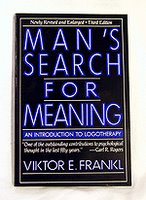 I am sitting at a neighborhood Starbucks after work. In other words, not at the usual bookstore. Tonight, at my usual roost, they are having their Christmas party, and I don’t feel like being in the midst of such hoopla!
I am sitting at a neighborhood Starbucks after work. In other words, not at the usual bookstore. Tonight, at my usual roost, they are having their Christmas party, and I don’t feel like being in the midst of such hoopla!So I’m sitting here thinking of Viktor Frankl....
The book shown here, Man’s Search For Meaning, is definitely one of the most profoundly important books I have ever encountered.
Viktor Emil Frankl, M.D., Ph.D. was Professor of Neurology and Psychiatry at the University of Vienna Medical School. I remember when the newspaper reported his death (Sept.2, 1997). I cut out the clipping and affixed it to the inside cover of my copy of Man's Search. It is impossible to read him and be unaware of the great genius of this man.
An American doctor once asked Viktor Frankl to explain the difference between conventional psychoanalysis and logotherapy. Before answering, Frankl asked the doctor for his definition of psychoanalysis.
The man said, "During psychoanalysis, the patient must lie down on a couch and tell you things which sometimes are very disagreeable to tell."
Frankl immediately replied by saying: "Now, in logotherapy the patient may remain sitting, but he must hear things which sometimes are very disagreeable to hear."
By this he meant that in logotherapy the patient is actually confronted with and reoriented toward the MEANING of his life. The role of the therapist, then, is to help the patient discover a purposefulness in his existence.
Frankl's theory is that man's search for meaning is the primary motivation in his life and not a "secondary rationalization" of instinctual drives. Whereas Freudian psychoanalysis focuses on the "will to pleasure" and Adlerian psychology focuses on the "will to power" it can be said that Frankl's logotherapy focuses on the "will to meaning."
Does man give in to to conditions or stand up to them? According to Frankl, the strength of a person's sense of meaning, responsibility, and purpose is the greatest determining factor in how that question will be answered. He believed that "man is ultimately self-determining" and as such, "does not simply exist but always decides what his existence will be, what he will become in the next moment."
 The first (and largest) section of this book is the searing autobiographical account of the author's experience as a prisoner in a concentration camp. He spent three years at Auschwitz and Dachau. These camps claimed the lives of his father, mother, brother, and wife. Frankl's survival and the subsequent miracle of this book are a testimony to man's capacity to rise above his outward fate.
The first (and largest) section of this book is the searing autobiographical account of the author's experience as a prisoner in a concentration camp. He spent three years at Auschwitz and Dachau. These camps claimed the lives of his father, mother, brother, and wife. Frankl's survival and the subsequent miracle of this book are a testimony to man's capacity to rise above his outward fate.As Gordon W. Allport states in the preface, "A psychiatrist who personally has faced such extremity is a psychiatrist worth listening to."
I agree, and highly reccommend this book.
As the sub-title says, it is an "introduction" to logotherapy, and anyone who wants to go deeper into the principles and practical application of Frankl's existential psychiatry should go to his excellent book entitled The Doctor And The Soul. Or you can read more about Frankl and his ideas here, at the site that commemorates and elaborates upon his groundbreaking work.
Frankl was fond of quoting Nietzsche's dictum..."He who has a WHY to live can bear with almost any HOW."


